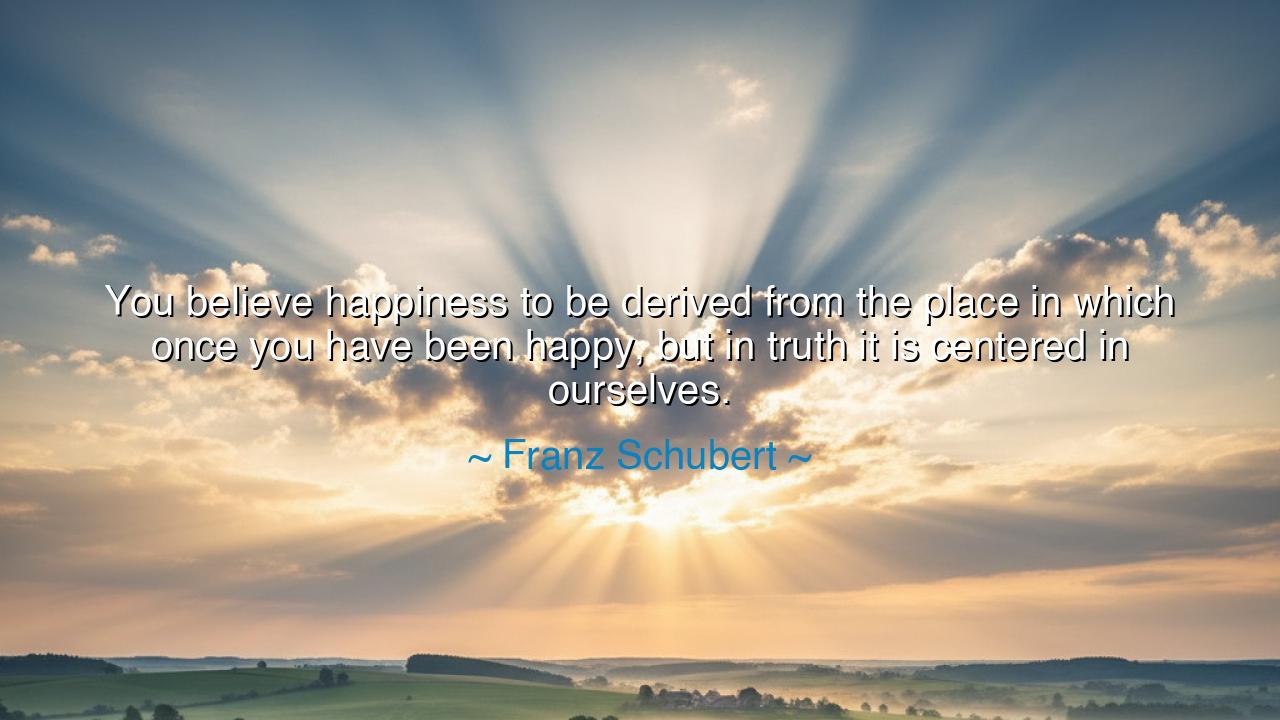
You believe happiness to be derived from the place in which once
You believe happiness to be derived from the place in which once you have been happy, but in truth it is centered in ourselves.






“You believe happiness to be derived from the place in which once you have been happy, but in truth it is centered in ourselves.”
Thus spoke Franz Schubert, the composer of tender melodies and sorrowful beauty, whose life was marked by both fleeting joys and profound melancholy. In this reflection, he unveils a wisdom that transcends time — that happiness does not dwell in places, nor in things, nor even in the moments of the past, but in the living spirit within us. How often do we, like pilgrims of memory, return to the gardens of our youth or the rooms of old love, hoping to find there the fragrance of joy once known? And yet, as Schubert reminds us, the joy is gone not because the place has changed, but because we ourselves have moved away from the source — for the source is the soul.
The origin of these words can be traced to Schubert’s own life — one of brilliance shadowed by loneliness. Though he composed music that seemed touched by heaven, his days were filled with hardship and uncertainty. He knew the ache of unfulfilled love, the struggle of poverty, and the frailty of health. And yet, amid all this, his art glowed with beauty and tenderness. He learned through suffering that joy cannot be chained to circumstance, nor can peace be summoned by revisiting the places of former happiness. The melody of contentment, he found, must be played from within.
Schubert’s insight speaks to the universal yearning of the human heart — the longing to reclaim lost happiness by retracing old paths. A man might stand again upon the hill where once he laughed with friends now gone, or walk through the streets where love once bloomed, believing that by returning to the place he might resurrect the feeling. But when the laughter echoes only in memory, when the air feels hollow and changed, he understands what Schubert knew: it was not the place that gave him joy, but the heart that was open to joy. Happiness is not of the landscape; it is of the soul’s weather — and it travels wherever we do.
This truth has been revealed again and again through the ages. Consider the story of Marcus Aurelius, the philosopher-emperor of Rome. Surrounded by the burdens of empire, by wars and betrayals, he found no refuge in palaces or power. Instead, he turned inward, writing in his meditations that the mind, rightly ordered, is its own sanctuary. “Nowhere,” he said, “can man find a quieter or more untroubled retreat than in his own soul.” In this he and Schubert are of one spirit. Both teach that peace and happiness are not gifts of place or time, but the result of a soul aligned with truth, gratitude, and self-understanding.
The danger, Schubert warns, is that nostalgia deceives us. It paints the past in brighter colors than it wore, convincing us that happiness can be found by returning to where it once seemed to live. But when we go back, we discover that the place has changed — or that we have. The temple we seek lies not in any city, but in the heart that knows how to dwell in the present. For as the river flows onward and the seasons turn, the secret of peace is to carry within us the same openness that once made those old moments sweet. Happiness is not behind us; it walks beside us, waiting to be recognized.
Schubert’s words also remind us that suffering and joy are born of the same root. The heart that feels deeply enough to mourn what is lost is the same heart that can feel gratitude for what remains. When we realize that happiness arises from our own perception — from how we choose to see, love, and live — we free ourselves from the illusion that joy depends upon external things. The house may crumble, the garden may fade, the friends may depart — but the capacity for wonder, for gratitude, for creation, still lives within us. It is a fire that no distance or time can extinguish.
So, my child, when you find yourself yearning for days gone by — for the laughter that once filled your youth, for the streets that once held your love — remember Schubert’s wisdom. Do not chase the ghosts of happiness. Create it anew. The spring that once nourished you still flows within. Sit quietly, and let gratitude draw it forth. Turn not outward, but inward; the world outside changes, but the soul’s well of joy is eternal.
And here lies the lesson: wherever you go, carry yourself with tenderness, and happiness will follow. Make your mind your home, your compassion your garden, your faith your sunlight. Then no matter how the seasons change, you will find the melody of joy still playing within you — quiet, steady, and true, like the music of Schubert himself. For the places of happiness fade, but the heart that knows how to be happy endures forever.






AAdministratorAdministrator
Welcome, honored guests. Please leave a comment, we will respond soon